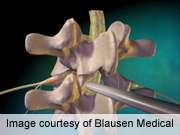Smoking, by itself, is not associated with adverse outcomes in elective spinal surgery, but current smokers with more than 60 pack-years are more likely to die within 30 days of surgery than never smokers, according to research published in the July 1 issue of Spine.
(HealthDay)—Smoking, by itself, is not associated with adverse outcomes in elective spinal surgery, but current smokers with more than 60 pack-years are more likely to die within 30 days of surgery than never smokers, according to research published in the July 1 issue of Spine.
Andreea Seicean, M.P.H., Ph.D., of the Case Western Reserve University in Cleveland, and colleagues performed a retrospective analysis of prospectively collected data for 14,500 adults from the American College of Surgeons National Surgical Quality Improvement database. The association between smoking and 30-day outcomes for spine surgery was assessed.
The researchers found that, in unadjusted analysis, former smokers undergoing elective spine surgery had significantly higher risk of prolonged hospital stay (odds ratio [OR], 1.2) and major complications (OR, 1.3) compared with never smokers. In adjusted, matched patient models, no association was found between smoking status and adverse outcomes. Compared with never smokers, current smokers with more than 60 pack-years had a significantly increased risk of dying within 30 days of surgery (OR, 3.0).
"Although current smokers with more than 60 pack-years were more likely to die within 30 days of surgery compared with never smokers, our analysis of a large, prospective, multi-institutional database suggests that a current or prior history of smoking does not predispose individuals undergoing elective spine surgery to increased risk for operative or short-term postoperative morbidity or mortality," the authors write.
More information:
Abstract
Full Text (subscription or payment may be required)
Journal information: Spine
Health News Copyright © 2013 HealthDay. All rights reserved.



















